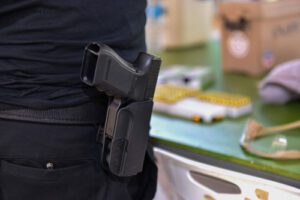 Judge Bumb continued: Although we have no occasion to comprehensively define “sensitive places” in this case, we do think respondents err in their attempt to characterize New York’s proper-cause requirement as a “sensitive place” law. In their view, “sensitive places” where the government may lawfully disarm law-abiding citizens include all “places where people typically congregate and where law-enforcement and other public-safety professionals are presumptively available.”
Judge Bumb continued: Although we have no occasion to comprehensively define “sensitive places” in this case, we do think respondents err in their attempt to characterize New York’s proper-cause requirement as a “sensitive place” law. In their view, “sensitive places” where the government may lawfully disarm law-abiding citizens include all “places where people typically congregate and where law-enforcement and other public-safety professionals are presumptively available.”
It is true that people sometimes congregate in “sensitive places,” and it is likewise true that law enforcement professionals are usually presumptively available in those locations. But expanding the category of “sensitive places” simply to all places of public congregation that are not isolated from law enforcement defines the category of “sensitive places” far too broadly. Respondents’ argument would in effect exempt cities from the Second Amendment and would eviscerate the general right to publicly carry arms for self-defense that we discuss in detail below. Put simply, there is no historical basis for New York to effectively declare the island of Manhattan a “sensitive place” simply because it is crowded and protected generally by the New York City Police Department. [Id. at 2133–34 (internal quotations and citations omitted).]
With the guiding instructions and principles given in Bruen, this Court examines the challenged state law provisions. But before doing so, the Court repeats the following observation. The State’s Brief spends considerable time setting forth what the Legislature’s concerns were: “The Legislature found that the elimination of the ‘justifiable need’ requirement resulted in ‘the likelihood that a much greater number of individuals will now qualify to carry handguns in public,’ necessitating identifying ‘sensitive places where, due to heightened public safety concerns, carrying a dangerous, potentially lethal device or weapon, including a handgun, is not permissible.’” [State’s Br. at 5 (citing 2022 N.J. Laws c. 131 § 1(e)).] The Legislature also recognized the unique dangers of having loaded firearms in vehicles. [Id. at 7.]
All of these Legislative concerns are irrelevant if the related legislation is unconstitutional. The New Jersey Legislature repeated the same concerns that did not justify similar legislation that the United States Supreme Court found unconstitutional regarding New York and the Bruen case.
